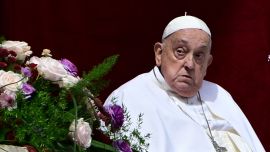Venezuelan opposition leader María Corina Machado warned Wednesday she and allies face possible "unjustified" detainment ahead of July's presidential vote, as incumbent Nicolás Maduro pushes for a new "anti-fascism" law critics say will be used to further crush dissent.
"My teams throughout the country are at risk of forthcoming forced disappearances and I myself could be subject to unjustified detention," Machado said in a letter to 18 countries plus the European Union's foreign affairs chief, all of whom participated last April in a Colombia-hosted conference on Venezuela's political crisis.
Machado overwhelmingly won an opposition primary last year to face off against Maduro, who is seeking a third six-year term, but she was not allowed to appear on the July 28 ballot.
The 56-year-old has been barred from public office for 15 years by courts loyal to Maduro on corruption charges widely dismissed as spurious, and for supporting Western sanctions against Venezuela.
Her coalition, the Democratic Unitary Platform, sought to register a candidate to run in Machado's place, but was forced at the last minute to sign up a different person after being unable to access the elections site.
Machado said Wednesday she "continues to be prevented from leaving the country and even from taking flights within Venezuela, while many of the people who support me in my campaign events are the object of retaliation."
She said eight associates had already been detained while arrest warrants have been issued for seven more.
Six people with ties to Machado have taken refuge in the Argentine Embassy over fears of arrest.
Maduro recently called Machado's party a "terrorist movement" and is pushing for a new law to counter "fascism," a term he frequently uses to refer to opponents.
Critics say the legislation, which passed a first reading Tuesday in the government-dominated National Assembly, would be used to crack down further on Venezuela's opposition.
The 30-article bill "aims to establish the means and mechanisms to preserve peaceful coexistence and public tranquility," as well as to "protect Venezuelan society from the emergence of any expression of a fascist, neo-fascist or similar nature."
One article states that "any person who solicits, invokes, promotes or executes violent actions as a means or channel for the exercise of political rights will be punished with a prison sentence of eight to twelve years and political disqualification for the duration of the sentence."
The "dissemination of prohibited messages" could also be met with fines up to US$100,000 and revocation of broadcasting licences.
Many countries, including the United States, refused to accept Maduro's 2018 victory, alleging fraud and a lack of transparency. That vote was boycotted by the opposition.
Machado has accused Maduro of violating an agreement signed by the government and the opposition in Barbados last year, which promised to hold a free and fair vote in 2024 with international observers present.
That deal led Washington to ease sanctions to allow Chevron to resume limited crude extraction in Venezuela – a decision it is now reconsidering.
– AFP

























Comments